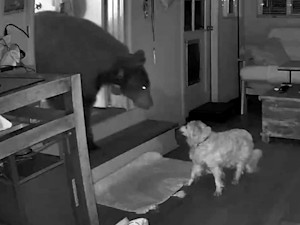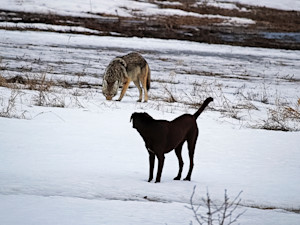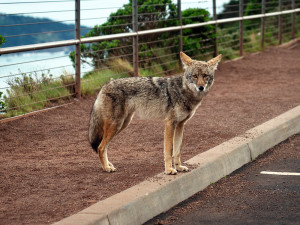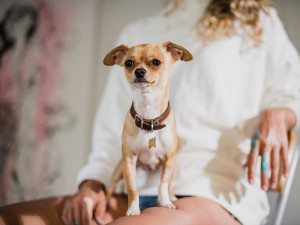Study Says 80% of Dogs Won’t Protect Their People From a Bear—Would Yours?
“This is a grudge match from time immemorial.”
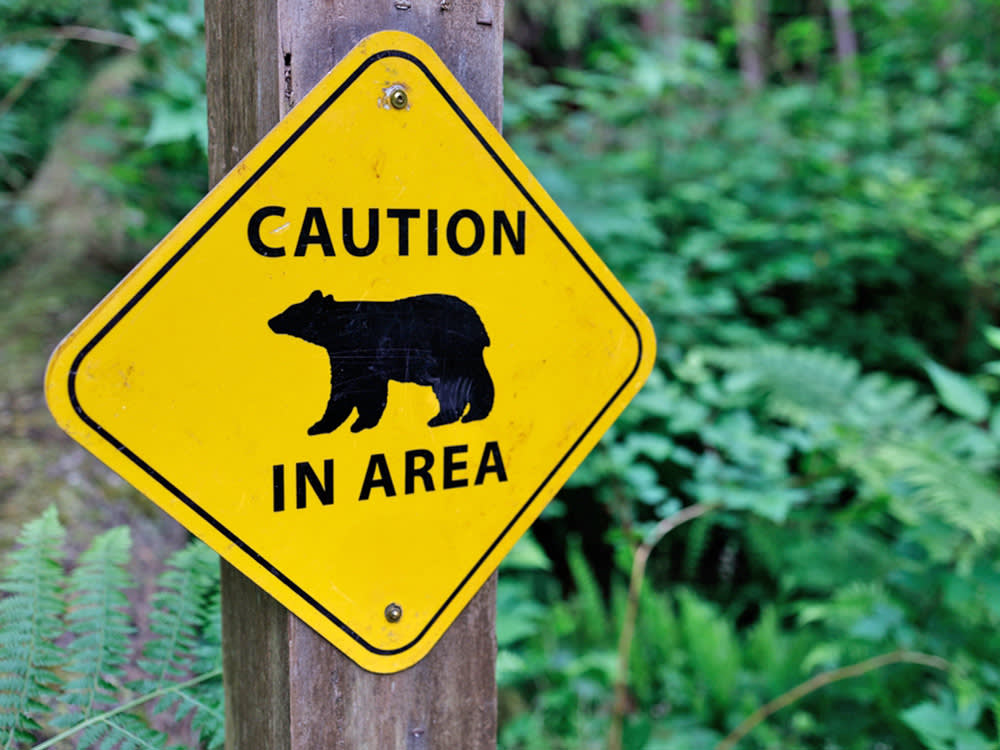
Share Article
Your dog is your number-one fan, your best bud, and your... biggest protector? We all would like to think that if we were in serious danger our dogs would rush to our sides (and there are plenty of news-story anecdotes that prove as much, like this dog who fended off a rattlesnake opens in new tab for his human). But apparently, this protective instinct only applies to certain species in the animal kingdom, and bears may not be on that list.
According to research from Professor Tom Smithopens in new tab at Brigham Young University in Provo, Utah, many dogs actually won’t protect their person opens in new tab against a big, scary bear. Smith and his students studied 326 bear attacks over the past several decades. They found that in 80 percent of the incidents, pups did not protect their pet parent from an encounter with the bear.
Smith said that in many cases, dogs took off and ran or “sat and watched” as the conflict continued. There were, of course, more specific stats where the attacks were concerned, Smith told Cowboy State Daily. “Dogs responded to bears attacking their owners 20.9 percent of the time (68 of 326 cases) and were successful 79.4 percent in stopping the bear’s attack (54 of 68 cases),” according to the study’s abstract. “However, in those instances the bear redirected its attack on the human, and 85 percent of those people sustained injuries to themselves ranging from slight to severe.”
And sadly, in only 4.6 percent of the cases, humans were able to save their pups from a bear, though that didn’t stop people from trying. “They’d go in there with their bare fists. Are you kidding me?” he said. Smith attributes this behavior to humans regarding their dogs more as “family” than as property these days.
Smith adds that people need to be very considerate before taking their pup into bear country. “This is a grudge match from time immemorial,” Smith said, citing the ongoing beef wolves and bears have had for centuries. He adds that a dog on a leash is “a wolf on a rope.”
He also warns that when dogs on leashes are attacked, the person on the end of the leash will most likely get attacked, too. But off-leash dogs are also not going to be safe from a bear, either of course. A study from the University of Wisconsinopens in new tab (which looked at non-fatal conflicts with black bears in the 48 continental United States over 17 years), 79 percent of these bear attacksopens in new tab on dogs involved a dog who was off-leash.
He advises just playing it safe and keeping your pup far away from where bears might be. But in this case of a surprise bear encounter, bear spray could go a long way in keeping you and your leashed dog safe.
According to California Fish and Wildlifeopens in new tab, the best way to keep your dog safe from bears includes a lot of preventative measures. If you live or vacation in an areas where bears might be nearby, follow these steps, among others: Keep your grills clean and food clean, keep garbage cans locked away when they’re not out for pickup, and feed pets indoors.

Hilary Weaver
Hilary Weaver is the senior editor at Kinship. She has previously been an editor at The Spruce Pets, ELLE, and New York Magazine. She was a staff writer at Vanity Fair from 2016 to 2019, and her work has been featured in Esquire, Refinery 29, BuzzFeed, Parade, and more. She lives in New York City and New England with her family, which includes two herding pups, Georgie and Charlie.
Related articles
![a dog from Curb Your Enthusiasm wearing a coyote vest]()
Pay Attention to the “Curb Your Enthusiasm” PSA for Dog Coyote Vests
Clearly, Larry David wants your pup to be safe from coyotes. Here’s why you should, too.
![Elderly dog squares off with wild bear inside home while owner sleeps through harrowing encounter.]()
17-Year-Old Dog and Bear Have a Standoff in California Living Room
The whole thing was caught on video.
![A dog and a coyote in the snow.]()
What Happens When a Dog Meets a Coyote
The two animals are close relatives — but that doesn't mean they'll play nice.
![Portrait of a coyote standing on a red gravel path next to the street staring at the camera]()
How to Protect Your Dog From Coyote Attacks
Social media influencer Ashley Yi’s dog was killed by a coyote. Here are some tips for keeping your pup safe.
![Small tan dog on the lap of a woman in a protective stance]()
How Can You Stop Your Dog From Being Overly Protective of You?
Dog trainer Robert Haussmann’s tips for dealing with a protective dog that’s taken their duties too far.

